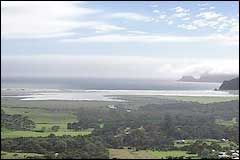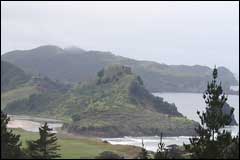Wetlands
 Whangapoua wetlands provide homes for the endangered brown teal |
|
 Awana Bay and wetland areas of the Awana Stream are on the eastern coast of Great Barrier Island |
Wetland environments are among the world's most threatened habitats. New Zealand has just 10% of its original wetlands. The other 90% have been reclaimed through drainage and often turned into pastureland.
Wetlands are habitats that provide homes for a huge and diverse range of plants and animal life. They also provide buffers for the rest of the land during droughts and floods. Wetlands can provide moisture during dry periods and can help absorb large amounts of water during a flood, preventing mud and debris building up in waterways.
Great Barrier has a diverse range of wetland ecosystems such as Whangapoua harbour. Here the biodiversity is largely undisturbed by housing developments and farming, which are commonly seen around coastal New Zealand. In this harbour there are zones of tidal wetland such as salt marshes and mangrove forests.
Further inland from these salt zones are freshwater ecosystems of swamps and flood plains. These habitats have high conservation priority and are home to rare and endangered species such as the brown teal and banded rail.